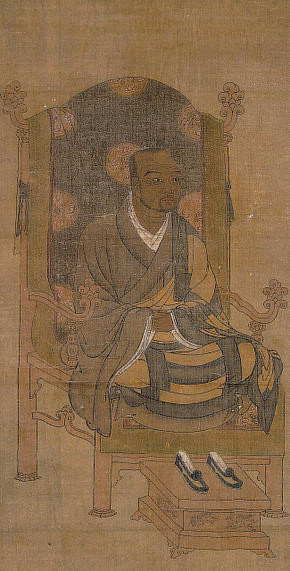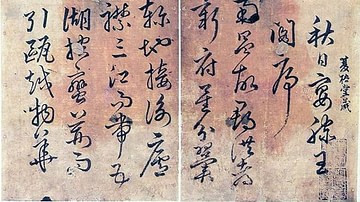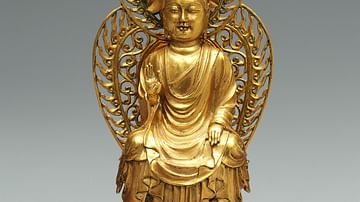
Wonhyo (l. 617-686 CE) was a Korean Buddhist philosopher whose works impacted a wide array of later philosophers and writers through his teaching that one’s interpretation of the world created one’s reality. He is highly regarded as the greatest thinker of his time and his philosophy has become an integral part of the Korean Buddhist tradition.
Although little known in the West, Wonhyo continues to be highly regarded in the East and in his native Korea in particular. He produced almost 90 works of philosophy and, clearly, was a prolific writer. Many of these works still exist in whole or in part today and are still studied by Buddhist monks around the world as well as individuals interested in Buddhism and self-awareness. His philosophy continues to be taught in schools throughout the Korean peninsula and his writing remains as influential in the modern day as it was during his lifetime centuries ago.
He is regarded with the utmost respect for these works for their profound understanding of the power of perception to define reality. As with all great sages and founders of religious or philosophical traditions, Wonhyo did not set out to establish a school of thought or become famous but was simply living his life when a certain experience transformed his way of thinking and he then felt compelled to share his truth with others.
His essential teaching is that perception shapes and defines the world one experiences. One’s secular life or religious life is equally defined by one’s interpretation of experience. The concept of “true spirituality” or a rejection of a spiritual life is equally the result of what one accepts as “true” in life but, as Wonhyo explains, that acceptance or rejection is entirely up to individual interpretation and judgment.
In Wonhyo’s teaching, life is essentially like a glass of water. The water is simply water; what one adds to that water will make it taste bitter or sweet, but the water is just water. Each individual, therefore, is responsible for how their water tastes.
His vision is comparable to the Greek Pre-Socratic Philosophers Parmenides (l. c. 485 BCE) and Zeno of Elea (l. c. 465 BCE) as well as the Greek sophist Protagoras (l. c. 490 – c. 420 BCE) which is especially interesting in that Parmenides’ and Zeno’s philosophy was in complete opposition to that of Protagoras. In the present day, Wonhyo’s teaching is not only still considered relevant but is recognized for its transformative power in people’s lives while, though still important in the development of Western Philosophy, the fragments of Parmenides, Zeno, and Protagoras no longer exert that same influence.
Early Life & Enlightenment
Little is known of Wonhyo's early life. He was born in Amnyang (in modern-day South Korea) into a Buddhist family, but nothing is known of them other than that they were so-called common people who followed the Buddhist tradition. He was brought up in the Korean tradition of Buddhism as all of his peers would have been and, when he was of age to continue his studies further, decided to go to China to study Buddhism with the great masters, and it was on this trip that he attained enlightenment.
According to Wonhyo's famous story, he had traveled a long way and was very tired and thirsty as night fell. He found what he thought was a cave and crawled in. As he groped across the ground in the dark, his hand touched a bowl that was full of rainwater, and he drank before going to sleep.
When he woke up the next morning, he discovered that the 'bowl' was a decomposing skull full of old water, decaying leaves, and maggots and that he had slept in a tomb. He was so disgusted that he vomited and began to run from the tomb — that was when enlightenment came.
Wonhyo drank from the skull because he was thirsty and thought he had found a bowl full of water left sitting in a cave. When he realized that the “bowl” was a rotting skull and the “cave” was a tomb, he was horrified until he paused to consider that the “bowl” was the same as the skull and the “cave” the same as the tomb he had slept in and all that had changed was his perception of these things.
The skull and tomb had always been a skull and tomb – and he had been grateful for them – until his past experience caused him to judge a skull and tomb as “bad” and a bowl and cave as “good”. There was no difference in these things themselves; the only difference was in his perception of these things.
His interpretation of the skull and the tomb made them 'good' in the dark and 'bad' in the light, but nothing had changed about those things themselves. This led him to his great revelation that 'Thinking makes good and bad," which just means that individual perception creates values that people call 'good' or 'bad' but the objects themselves might be neither.
Realizing the importance of his new understanding, Wonhyo abandoned his trip to China and returned home. He became a teacher and devoted himself to the enlightenment of his students, while always remaining aware that he was a student himself and was always learning. The historian John M. Koller comments:
Not only did he create a unique Korean Buddhist philosophy, but also some of his writing came to influence the greatest Buddhist thinkers in China and Japan. His remark upon his enlightenment that "all is one and this one is empty" reflects what was to become the foundation of his metaphysics, namely the principle of total interpenetration of everything. His remark that "thinking makes good and bad" . . . reflects his view that originally there is one mind, and delusion and enlightenment only arise within the mind as the result of thoughts and feelings. (300)
The One Mind of Wonhyo’s philosophy was the universality of Being. Reality simply “is” and, if one recognizes the universal Oneness of Being, one is freed from the constraints of interpretation of that Being which cause one to judge some things as “bad” and other things as “good”.
Wonhyo's Philosophy
Wonhyo's experience with the skull and the tomb convinced him that the world of sense perception is an illusion. All that one thinks one sees is colored by how one has learned the world and that has been influenced by others and one’s own experience, and interpretation of that experience, within the confines of what one has been taught. If one has been brought up to fear skulls and tombs, stumbling into a tomb and finding a skull will be interpreted as a bad experience; but this is only interpretation, not reality.
When one learns to look truly at the world without preconceived judgment and without these learned perceptions, one recognizes that everything is One and there are no distinctions and no differences between people or objects. Everything proceeds from the One Mind, and everything a person experiences is a part of that One Mind. The trick is to recognize this and awaken to the existence of the One Mind and all that it means, but to do this, one must first want to awaken.
People are so comfortable with their dream delusions that they are unwilling to let them go and cling to them when they are threatened. Wonhyo tried to alleviate people's fears by writing a treatise on the philosopher Ashvaghosa's work Awakening of Aspiration. Ashvaghosa felt sorry for people because they were so blind and deluded, and he tried to encourage them to seek something higher than pursuit of food and drink and physical pleasure. Wonhyo's commentary on Ashvaghosa's work simplified the teaching. It emphasized the actual emptiness of the universe which has no 'dark' and no 'light' and no 'life' and no 'death' but only has itself, what it is, without labels.
People tend to label things, and as soon as they do, they claim to know what those things are and what they mean, but those things one labels are never what one thinks they are. One thinks one is right in one's labels and then finds other people who agree with one's labels and subsequent world view, but that does not mean that those labels are right.
Once a person has awakened from delusion and self-satisfaction, then they can recognize the One Mind and the fact that all things are one. Humans are here in this world to accomplish this goal because it is only here that one is faced with so many temptations to be led astray, and so the brilliance of illumination shines more clearly once recognized.
Correlation to Greek Philosophy
Wonhyo has been compared to two very different Greek philosophical traditions: the Monist School – which claimed reality was One – and the Relativist School which maintained that whatever one thought to be true, was true. The philosopher Parmenides founded the Eleatic School which taught Monism - that reality was uniform in essence and only appeared to be different owing to sense perception. A tree, for example, might seem to be different from a person but is only so in appearance, not in essence. Parmenides’ student Zeno of Elea attempted to prove his mentor’s vision through a series of logical paradoxes which are still discussed and puzzled over today.
The Monist vision has been compared to that of Wonhyo in that both claim that Being is One, undifferentiated, and what makes a person call one thing “bad” and another thing “good” is only sense perception, what one has learned to define these things as being and how one has learned to value one thing over another. Interestingly, Wonhyo’s vision has also been linked to that of the relativist Protagoras who claimed that “man is the measure of all things”, meaning that each individual’s perception of reality is true to that individual. If one person thinks a drink is too hot, and another thinks that same drink is too cold, both are correct according to their understanding based on prior knowledge of “hot” and “cold”.
Wonhyo’s One Mind fits neatly with both of these philosophical views without contradiction in that he also believed that Being was One but also that what one claimed to be true was true – at least until one understood actual Truth. True spirituality – understood as apprehension of Truth – was available to anyone who could discard appearances, according to Wonhyo. In this, he is completely in line with the philosophy of Parmenides and Zeno.
At the same time, until one was ready to accept the path of true spirituality and enlightenment, one’s interpretation of reality would remain one’s truth – just as Protagoras said – and one would be correct in claiming a skull was a fearful object or that it was a useful bowl depending on how one was raised and what one accepted as truth.
In the same way Wonhyo’s vision bridges the philosophies of Monism and Relativism of ancient Greece, it settled doctrinal differences in the Buddhist schools of Korea. Koller writes:
To see the logical basis that Wonhyo used to reconcile doctrinal differences between the different schools and teachings [of Buddhism] we need to look at his “Treatise on Ten Approaches to the Reconciliation of Doctrinal Controversy” which was written expressly for the purpose of carrying out the harmonization of disagreements concerning the Buddhist doctrine. There he applies the metaphysics of interpenetration to demonstrate the fundamental lack of obstruction between the arbitrary imposed conceptual structures that had contributed to heated debates between the various doctrinal sects of East Asian Buddhism. Proceeding on the basis of his insight into the unity of all things because they all proceed from the “One Mind”, Wonhyo was able to harmonize the many diverse interpretations of Buddhism as a single unified teaching because they were all manifestations of the one true original teaching. (300-301)
Wonhyo’s One Mind – his philosophical vision of Being – is that everything is uniform and One without differentiation and all that separates one person from another, one race from another, one class of society from another, one philosophical or religious belief from another, is perception and interpretation. Reality itself is uniform and all people and everything else shares in that uniformity; it is only the inability to recognize this that causes differences and disturbances.
Legacy
Wonhyo's vision affected only Korean Buddhism initially but his influence was later felt throughout China and Japan and reverberated even further. By emphasizing Buddha's ideal of Oneness, how the failure to grasp the reality of an objective reality caused one to suffer, and his skill at explaining it so clearly, Wonhyo was able to make the concept of enlightenment easier to grasp. Enlightenment was no longer the lofty goal of an ascetic or even an ideal but was simply a way to live a better and more peaceful life. By recognizing that all is One, a person would be set free from the delusion of the senses and could stop acting and reacting to circumstances wrongly.
In this aspect of his philosophy, Wonhyo's vision is also very close to another Greek philosopher, Plato. In Plato’s Allegory of the Cave in Book VII of his Republic, he relates how one must free one's self of the belief in the reality of the shadows on the cave's walls before one can see the true objects that are casting those shadows. Wonhyo's teachings touched many people but, interestingly, the many religious institutions that maintained different views on Buddhism refused to cooperate with each other or compromise their practices even though Wonhyo had ably harmonized them.
Wonhyo himself said that if they had understood the reality of the One, they would have recognized that religious differences are only one more misguided label that causes strife and prevents understanding. It is Wonhyo's universal vision of a family of humankind that resonates so powerfully with readers, from the past up to the present day.







